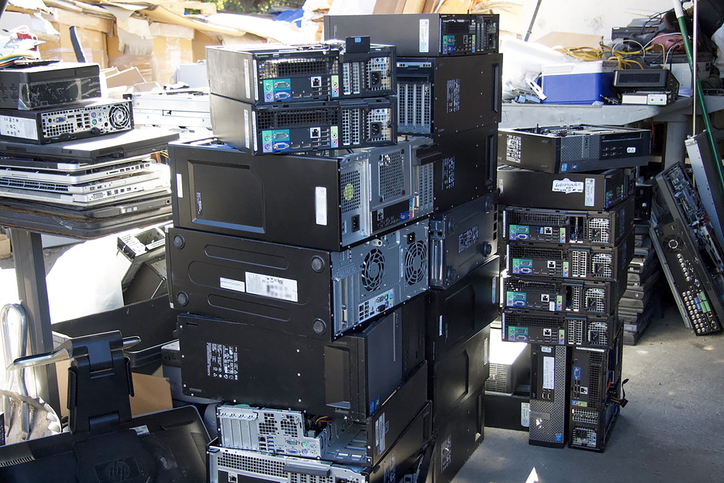Knowing how to recycle electronics safely is a vital part of protecting your organization’s private data. But data security isn’t the only thing at risk when you’re getting rid of electronic items you no longer need. There are also environmental and health and safety considerations around electronics recycling, as well as liability concerns. Every organization needs to have plans in place for safely handling all your e-waste. It’s in everyone’s best interest if everyone on your team knows how to recycle electronics safely.
What to know before recycling electronics
Here are a few things that make electronics recycling unique:
Data Security: Sensitive information about your organization, your customers and you and your employees can be stored on any number of electronics. Wiping a device’s memory doesn’t guarantee that data is erased forever. Proper electronics recycling requires the permanent destruction of anything that could potentially store data. You need to remain in control of all your data all the way through its destruction. Even if your private information is accessed inside a device that you got rid of, that breach is your organization’s responsibility.
Environmental: Improperly recycled electronics sometimes end up dumped in remote spots or trash heaps, where they can gradually start to leach hazardous chemicals into the local soil and groundwater. At some unsafe waste sites, e-waste is destroyed in burn pits, creating toxic airborne pollution that’s especially dangerous for nearby children.
Personal safety: This factor is especially important for employers to consider, because an employee could be hurt by attempting any DIY recycling methods on company electronics. Anyone could be injured by trying to break into a device that’s not designed to come apart easily.
How to Recycle Electronics Safely: 4 Principles
- Don’t disassemble or destroy electronics yourself. DIY methods like drilling into hard drives or soaking them in acid could be hazardous to you and others around you. It’s also unnecessary to take electronic devices apart before recycling them. Disassembling devices just increases that risk that you’ll expose sharp components that could cut you or someone else, or that you’ll come into contact with hazardous materials. Electronics disposal best practices say to leave them in their current state when you turn them over to a recycler.
- If it can store private data, it must be recycled. Donating a bunch of old computers to a worthy cause could be a tax break and a nice thing to do for the community. But you must remove (and kindly replace) the hard drives first. If that’s not possible, only donate or sell electronics that can’t store a user’s data. Even printers may store data, and the new owner could potentially access its memory and reprint copies of your private documents.
- Dispose of e-waste in a timely fashion. There are a lot of reasons you don’t want to leave a lot of obsolete electronics sitting around in your facility. They take up storage space, especially big devices like printers and desktop computers. In electronics that contain batteries, those batteries may start to leak over time from disuse and become caustic. It’s also a data security risk to let electronics pile up over time. A well meaning employee may take it upon themselves to dispose of, giveaway or re-sell electronics that seem to be sitting around unused and taking up space. It also means that anyone with access to those devices could access data on old computers, cellphones and even electronic ID badges.
- It’s your responsibility to choose a reputable recycler for your organization’s e-waste. Ultimately you really don’t have to know anything about how to recycle electronics, as long as you work with a recycler you trust. It’s their job to break down and sort your electronics in a safe and secure way. Specifically, you need to make sure your electronics recycler has the capacity to safeguard and ultimately destroy anything that can store sensitive data. Hard drives and other data storage drives need to be removed from electronics and shredded so any data is permanently destroyed.
Electronics recycling should be simple for your organization.
Let Miller Recycling handle all the logistics. We know how to recycle electronics safely and sustainably, and we can help you design a more efficient recycling system. While we manage the recyclable components, our sister company Northeast Data Destruction can provide commercial shredding services to destroy hard drives and other device components that can store data. All you have to do is schedule a pickup. Contact us today.


